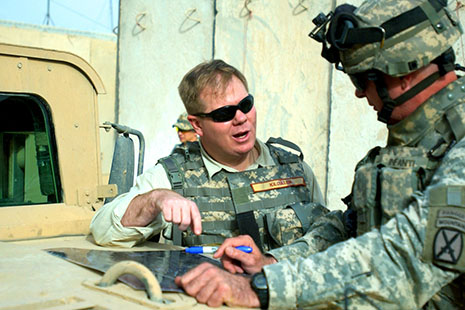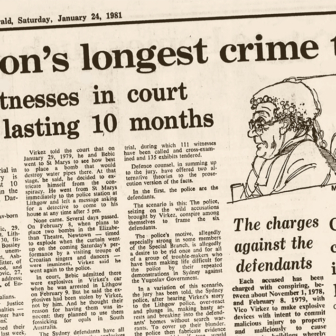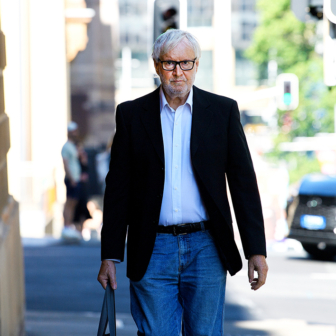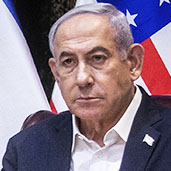DAVID KILCULLEN, a former Australian army officer, was the outspoken but widely respected counter-insurgency adviser to former US secretary of state Condoleezza Rice and senior adviser to General David Petraeus during the successful 2007 US military surge in Iraq. He once famously (and to his subsequent embarrassment) told an American reporter that the invasion of Iraq was “fucking stupid.”
Now forty-two, and based in Washington DC, Kilcullen has distilled what he learned during twenty-five years of academic study of counter-terrorism and counter-insurgency warfare, and during combat operations in East Timor, Bougainville, Afghanistan and Iraq, into a compelling book aimed at changing the policies of western governments fighting Islamist extremism in Iraq and Afghanistan and perhaps elsewhere.
The Accidental Guerilla is a revisionist analysis of modern anti-terrorist warfare informed by Kilcullen’s personal experience at the sharp end of conflicts. The book’s relevance has been heightened by President Obama’s decision to wind back troop numbers in Iraq and to send 21,000 more troops to Afghanistan to counter resurgent Taliban forces. The inability or unwillingness of neighboring Pakistan to deal with Islamist terrorists operating within its borders has also sharpened the urgency of Kilcullen’s analysis. An expected increase soon in the number of Australian troops (currently 1090) in Afghanistan will ensure that his views have an impact among Australian policy-makers.
It is not easy to sum up and do justice to Kilcullen’s rich and complex argument. But essentially he says that the massive western military interventions in Iraq and Afghanistan, while understandable, were counterproductive. The strategic, moral and material costs of the Iraq war, the failure of the Middle East democratisation agenda, widespread American unpopularity and loss of credibility, a crisis of confidence among western allies in the Muslim world, and a boost to al Qaeda recruitment and support had all proved contrary to US interests, at least in the short term, Kilcullen writes.
One possible alternative would have been a containment policy to limit the spread of violence. “[T]here is a strong case,” he argues, “for adopting a policy of balanced response that makes limited use of intervention within a context of continuous engagement and a broader containment approach.” He is, in short, against massive military interventions to fight Islamist terrorism, and believes that indirect, highly localised partnerships with the governments of countries under Islamist threat would “probably be much more successful than a policy of direct US intervention.” Kilcullen sees al Qaeda as the “inciter-in-chief” of Islamist terrorism but argues that the tendency to lump all threats together as “the global war on terror” only unifies disparate groups with differing aims, attitudes and ideologies.
A GRADUATE of Duntroon and the University of New South Wales, Kilcullen served as an infantry officer for twenty-two years. During that time he also worked in the Australian Office of National Assessments, the federal government’s intelligence analysis unit, and helped write Australia’s 2004 Terrorism White Paper. Since 2004 he has worked in Washington DC, where he wrote the counter-terrorism strategy for the 2006 US quadrennial defence review before joining the staff of Condoleezza Rice and General Petraeus.
The accidental guerilla syndrome is at the heart of Kilcullen’s analysis. Accidental guerillas are local people who, seeing battle joined by terrorists and foreign and local state forces, take up arms on the side of the terrorists not because they support extremism but because they oppose outside interference in their affairs. “The implications of the accidental guerilla syndrome are far-reaching and dealing effectively with it is likely to require a radical rethinking of some key western policies, strategies and attitudes,” he writes.
Kilcullen argues for political initiatives to construct credible alternatives to the choice Muslim populations are forced to make between supporting terrorism or collaborating with the west. He says an indirect and highly localised approach, working by, with or through genuine alliances and local partnerships, would probably be much more successful than a policy of direct US intervention. “[W]estern countries should seek to build genuine partnerships with local government and civil society networks, operate behind the scenes, avoid large-scale commitment of US combat forces, support locally devised initiatives and apply diplomatic suasion (rather than force) to modify local government behaviour,” he writes.
Kilcullen combines this sort of strategic analysis with case studies of Afghanistan, the 2007 Iraq surge and the Australian-led intervention in East Timor, which he sees as a transitional conflict that overlapped with the “war on terrorism.” He was personally involved in these conflicts and his field notes, reproduced in his book, bring a formidable authority to his analysis.
He believes the Afghanistan campaign is at a strategic crossroads, perhaps a “tipping point.” The problem, he notes, is Pakistan. While he sees the 2007 surge in Iraq as pulling the country back from the brink of collapse, Kilcullen argues that the “large-scale, high-profile, unilateral, uber-blitzkrieg manner in which the Coalition invaded Iraq… was deeply flawed… Iraq is an example of exactly the type of conflict we need to avoid if we seek to succeed in the broader long-term confrontation with takfiri extremism.” (Kilcullen uses the term “takfiri” to highlight the strand of heretical Islam he believes lies behind al Qaeda and similar organisations.)
With views like these it is intriguing to speculate about how Kilcullen managed to operate as a special adviser to Condoleezza Rice in the Bush administration. During our conversation Kilcullen volunteers that Rice hired him as her personal counter-terrorism adviser knowing that he was against the war. “We used to talk about it very frankly and it really wasn’t a problem,” he says.
Kilcullen says he would be arguing now against heavy military intervention in Afghanistan if the commitments had not already been made. “I’d be arguing for small teams, non-military wherever possible, to try not to create a big backlash response.” But, having intervened, “what we need to do now is to protect the population, beat the Taliban back so that it’s off the backs of the Afghani government and military and then grow those guys to the size where they can handle the problem on their own.”
Kilcullen plainly was perturbed by the abuse of Iraqi prisoners in Baghdad’s Abu Ghraib gaol and by the treatment of prisoners at Guantanamo Bay, although he makes no explicit reference to them in his book. He insists that it is not “an optional luxury or a sign of moral flaccidity” for the United States to assure other nations that it will exercise its power responsibly, sparingly and in accordance with international norms – a position rejected by the Bush administration.
“American power must be matched by American virtue, or it will ultimately harm both the United States and the global system,” Kilcullen writes. And quoting the American historian Andrew Bacevich, he argues that “the sun has set on the age of unquestioned Western military dominance. Bluntly the East has solved the riddle of the Western Way of War.” Strange words, perhaps, from a man who retired from the Australian Army as an infantry lieutenant colonel in 2005, was a counter-terrorism adviser in the Bush administration, and who is now part of The Crumpton Group, a Washington DC consultancy that provides advice to companies investing in international markets.
But not so strange from a man who holds a PhD in social anthropology and who brings a powerful evidence-based pragmatic outlook to countering terrorism. During our interview Kilcullen observes of the United States: “I don’t think either political party has a monopoly on understanding or not understanding this sort of thing… The real distinction in Washington is not between Republicans and Democrats. It’s between people who actually understand what’s going on the ground and people who take an ideological polemicist stance. And those guys exist on both left and right. Most of us who work in the field are pretty firmly clustered around the middle because reality bites.”
Kilcullen is deeply concerned about Pakistan’s inability to prevent Taliban extremists from using bases in its territory for violence against Afghanistan and India. “The problem is enormous,” he says, noting that Pakistan has 173 million people, 100 nuclear weapons and an army larger than the US army. “And al Qaeda headquarters are sitting right there in the two-thirds of the country that the government doesn’t control, and the fundamental problem is that the elected democratic politicians don’t control their own military, and very substantial elements in the military and intelligence services support the Afghan Taliban.
“I think the risk to Pakistan is state collapse and extremist take-over… And that would be a problem that would dwarf anything we have seen since 9/11. You would have Osama bin Laden with his hands on nuclear missiles, not just nuclear suitcase weapons, in a matter of weeks.” He says the west should move to strengthen the accountability and authority of the civilian government of Pakistan, and work closely to support the police force. He says there is also a need for regional security architecture to make Pakistan feel secure, particularly in its fraught relationship with India.
While for Kilcullen reality is complex, multi-layered and grim, he remains cautiously optimistic that the global threat from al Qaeda and similar localised groups is likely to “collapse under its own weight if we successfully contain these guys and we don’t do anything rampantly stupid like invading another Muslim country. It will take a while – five to ten years – and we will need to be vigilant. It will never go away completely but it is not going to be a threat to the world as long as we contain it effectively.”
Curiously Kilcullen has little to say in The Accidental Guerilla about the Israel–Palestine conflict, which most observers see as a key to resolving the broader issue of Islamist insurgency. The reasons, he says, were space limitations and his lack of experience on the ground in Israel. But he believes that the United States should be working to find a just and equitable solution that allows for the existence of Israel and gives justice to the Palestinians. “A lot of violence derives from anger and a lot of the anger we see in the Muslim world derives from injustice, and the Israel–Palestine conflict is an example of that,” Kilcullen says.
He is pragmatic about how to deter young Muslims from joining terror groups. “Right now if you are a bright ambitious, dedicated young Muslim male aged twenty to twenty-five the honorable course of action if you live in some of these countries is to fight the west because the alternative is a life of second-class status,” he says. “The brightest and the best in some cases have been choosing to fight us rather than accept that second-class status… What is going to defeat the idea of radical Islam is not a love for the west. It’s not that our ideas are going to triumph over theirs. We have to offer these guys not the choice between jihad and second-class status but the choice between wasting their lives as terrorists or going to law school or engineering school or taking good new jobs. It is having that alternative life pathway that turns guys off the terrorist track.”
Concluding The Accidental Guerilla Kilcullen calls for a new western grand strategy involving what he calls four crucial judgements. First, deciding whether western interests are best served by intervening in or by seeking to contain the spillover of violence and unrest; second, deciding how to allocate resources between military and non-military efforts; third, deciding how much to spend on the problem; fourth, deciding how to prioritise effort geographically.
Kilcullen will not be drawn on whether he believes that the Obama administration is more likely than the Bush administration to get these judgements right. “The Bush people screwed up,” he says. “Everybody knows that. The Obama people could well screw up just as badly.” It is a neutral observation but it is consistent. For Kilcullen the best or worst still may be to come. •
David Kilcullen talks to Inside Story contributor, Peter Mares, on Late Night Live >




